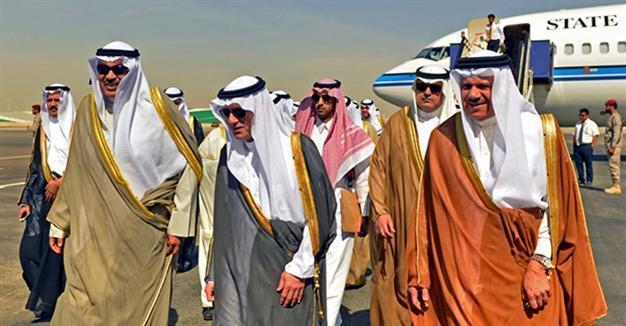Kuwait recalls Iranian envoy as crisis deepens
KUWAIT CITY - Agence France-Presse

A handout picture provided by the Saudi Press Agency (SPA) shows Saudi Minister of Foreign Affairs Adel bin Ahmed al-Jubeir (C) and Abdul Latif Bin Rashid Al Zayani (R) Secretary General of the Gulf Cooperation Council (GCC) for the Arab States of the Gulf, escorting Kuwait?s Foreign Minister Sheikh Sabah Khalid al-Hamad al-Sabah (L) and Qatari Foreign Minister Khalid bin Mohamed al-Attiyah (2R) upon their arrival to attend the ordinary meeting of 137th session of the GCC, on November 17, 2015
The diplomatic crisis surrounding Saudi Arabia and Iran widened Jan. 5 as Kuwait recalled its ambassador to Tehran in the face of growing international concern.
Joining Riyadh and its Sunni Arab allies in taking diplomatic action, Kuwait said it was withdrawing its envoy over a weekend attack on the Saudi embassy in Tehran.
Kuwait’s move came after the U.N. Security Council strongly condemned the attack, carried out by protesters angry over Saudi Arabia’s execution of a prominent Shiite cleric.
Tensions between Saudi Arabia, a Sunni power, and Shiite-dominated Iran have erupted this week into a full-blown diplomatic crisis, sparking widespread worries of regional instability.
Iran lashed out again at Saudi Arabia for the execution yesterday, with President Hassan Rouhani accusing Riyadh of seeking to “cover its crime” by severing ties. “One does not respond to criticism by cutting off heads,” Rouhani said, referring to the usual Saudi practice of carrying out executions with beheading by the sword.
Washington and other Western powers have called for calm amid fears the dispute could raise sectarian tensions across the Middle East and derail efforts to resolve conflicts from Syria to Yemen.
The Security Council joined those calls late on Jan. 4, issuing a statement urging all sides to “take steps to reduce tensions in the region.”
The statement by the 15-member council condemned “in the strongest terms” the attacks which saw protesters firebomb the Saudi embassy in Tehran and its consulate in Iran’s second-biggest city Masshad. But the council made no mention of the event that set off the crisis - Saudi Arabia’s execution on Jan. 2 of Sheikh Nimr al-Nimr, a cleric and activist whose death sparked widespread protests among Shiites.
Saudi Arabia cut off diplomatic ties with Tehran in protest at the attacks on Jan. 3 and has severed air links with Iran.
Some of its allies among Sunni Arab states followed suit, with Bahrain and Sudan breaking off ties and the United Arab Emirates downgrading relations on Jan. 4.
Kuwait said on Jan. 5 the embassy attacks “represent a flagrant breach of international agreements and norms and a grave violation of Iran’s international commitments.”
Rouhani has condemned the attacks and Tehran’s mission to the U.N. vowed in a letter to the Security Council to “take necessary measures to prevent the occurrence of similar incidents in the future.”
Iranian officials have brushed aside the dispute, with government spokesman Mohammad Bagher Nobakht saying on Jan. 5 it “will have no impact on Iran’s national development.”
“It is Saudi Arabia that will suffer,” he said.
U.S. Secretary of State John Kerry called his Iranian and Saudi counterparts on Jan. 4 to urge calm as European leaders raised concerns and Moscow offered to act as an intermediary.
The six-nation Gulf Cooperation Council (GCC) of Sunni Arab states said it would meet in Riyadh on Jan. 9 for talks on the embassy attacks, a day before the Arab League is due to hold an emergency meeting.
Iran and Saudi Arabia are on opposing ends of a range of crucial Middle East issues, including the war in Syria -- where Tehran backs President Bashar al-Assad’s regime and Riyadh supports rebel forces -- and Yemen where a Saudi-led coalition is battling Shiite insurgents. Despite the fears, Saudi Arabia’s ambassador to the U.N., Abdallah al-Mouallimi, insisted the row would not have an impact on efforts to resolve regional conflicts.
